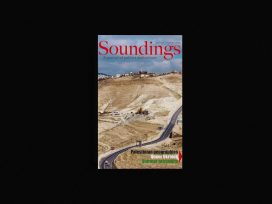Can’t we do better?
- Eurozine Review
6/2018
‘Soundings’ gets down to the nitty gritty of opposition; ‘Czas Kultury’ says LGBT+ in Poland has lost its way; ‘Dublin Review of Books’ reflects on Trumpian neediness and British moralism; ‘dérive’ examines informality in Vienna, Belgrade and Paris; ‘Atlas’ considers religious atheists, social outcasts and a cause without rebels; and ‘New Literary Observer’ closes in on Franco Moretti’s distant reading.
Soundings (UK) 68 (2018)
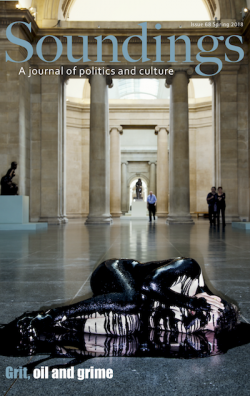
Talking to Soundings, political scientist Wendy Brown makes a very good point: ‘You don’t get from Le Pen or Farage or Trump any talk of democracy at all. You get law and order, you get statism, you get nationalism, you get restoration of white entitlement through nativism from extreme right politicians. But reference to democracy (other than to make it a stand-in for nationalism or patriotism) is very, very rare.’ Left opposition needs ‘grit’ and determination, she says: ‘It’s not about hope but something more like responsibility and maybe even curiosity: with our extraordinary brains and imaginations, our technologies and spirits, can’t we do better?’
Oil: ‘The question of how to avoid catastrophic climate breakdown is relatively simple: we have to decide which deposits to leave in the ground’, writes Adam Ramsay. The problem is: how to decide? The market can’t be relied on, that much is certain. Instead, considerations of historical justice must be central. In this respect, the UK has a particular obligation: ‘Per capita, the people of the UK are already historically responsible for more of the emissions in the atmosphere than those of any other country on earth apart from Luxembourg.’
Margaret Thatcher used oil revenue to ‘purchase public support’, argues Ramsay. Now, however, the North Sea Oil era is coming to an end – something that no amount of government subsidy can prevent. Terrified of the Scottish question, the Labour Party has acquiesced. It’s time for the Left to discuss ‘ways to deliver a just transition away from the oil to other good jobs while leaving much of it in the ground’.
Grime: Grime artists are ‘organic intellectuals’ ‘expressive of class identities and aspirations’, writes Monique Charles. Though the rap-dancehall-garage-jungle hybrid ‘may not be obviously political, the lived realities and hardships that are described certainly are’. ‘Jeremy Corbyn’s understanding of racism, poverty and homelessness struck a chord with Generation Grime. This is a generation that has grown up with policies that have effectively quarantined their life chances. Corbyn has returned to a politics that can represent their collective experience via a narrative of fairness, social justice and the redistribution of wealth.’
More articles from Soundings in Eurozine; Soundings’s website
Czas Kultury (Poland) 1/2018
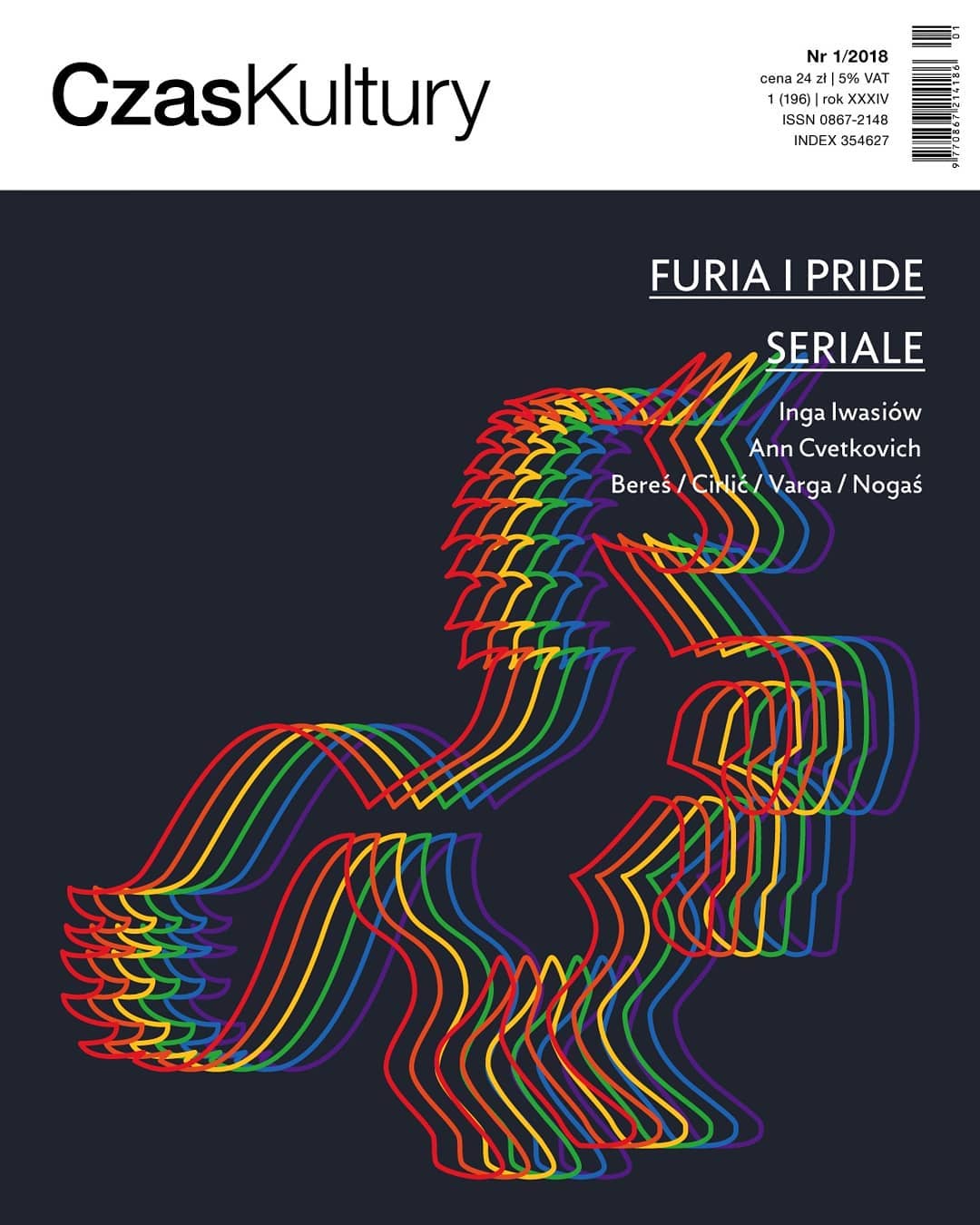
As the centenary of women’s suffrage in Poland approaches, Czas Kultury asks when the LGBT+ community there will achieve basic legal rights and social equality ‘without deceptions and half-measures’.
Sidelining LGBT: ‘If we agree that social diversity is more interesting than homogeneity and uniformity, we cannot go on sidelining the LGBT movement and treating it like an unruly pupil,’ writes Piotr Moszczenski. Focusing on Poznan (now reputed to be one of the more gay-friendly cities in Poland), Moszczenski argues that the first demonstrations organized there in the mid-2000s were neither bold nor uncompromising enough. More general discrimination issues – as well as issues of disability, economic inequality, and problems experienced by ethnic minorities – overshadowed the LGBT agenda, which was pushed out of the spotlight for years.
Solidarity vs. identity: The early LGBTQ movement in Poznan was largely formed and run by lesbian and bisexual women whose communalist approach to challenging discrimination flew in the face of neoliberal identity politics, writes Renata Kin. Their priority was to create an alternative cultural, political and social space, ‘a community built on a shared aim, a common vision of a better social reality’. Annual ‘Equality and Tolerance Days’ and demonstrations, dating back to 2004, reflected this broad agenda and drew in a range non-LGBT+ groups. Marches were disrupted by the extreme right, police and the municipal authorities, and the confrontations shaped media discourse on discrimination issues for a decade afterwards. Yet the women behind all this vanished from view as hierarchical and discriminatory mechanisms within the LGBT movement itself came into play.
Cultural anxiety: Przemyslaw Gorecki suggests that Poland suffers from deep-seated cultural anxiety about otherness generally. ‘The current government encourages a climate of transphobia, misogyny, homophobia and economic discrimination against the precariat – those living in unpredictable or insecure economic and psychological conditions’. But despite the consequent dangers faced by the gay and transgender community, Gorecki warns LGBT+ people against compromise with the mainstream. ‘This threatens to devalue many of our issues and ideals. We need to regroup and fight for opposition as a value in itself, as well as struggling for the principle of “alter hospitality” – that special hospitality towards people who seem somehow unfamiliar or different.’
Also: Alicja Kisielewska examines the cultural ideology promoted by television serials in Poland, and ways in which they consolidate existing beliefs and assumptions, especially about the traditional shape of the family.
More articles from Czas Kultury in Eurozine; Czas Kultury’s website
Dublin Review of Books (Ireland) 99 (2018)

Reviewing Michael Wolff’s Fire and Fury: Inside the Trump White House in Dublin Review of Books, Jon Smith is in pessimistic mood: ‘One senses [Trump] could win the 2020 election by a landslide and still use his acceptance speech to air his festering grudges’. In fact, thinks Smith, neediness is one of the US president’s defining characteristics: ‘Trump is that strangest of creatures: a confidence man with no confidence.’ But he and his supporters share much: ‘Trump’s rise suggests that huge numbers of them are as bent on instant gratification as he is. Voting becomes not a tactical decision with long-term consequences but a release of anger or a stamp of approval for a satisfying performance.’
Homosexuals, drunks and weirdos: Reviewing a book by Richard Davenport-Hines on Britain’s ‘Cambridge Five’ Soviet spy ring, Brian Boyd remarks: ‘There is indeed no spectacle so ridiculous as the British public in one its periodical fits of morality; consider that many in Britain called for Philby, Maclean and Burgess to face the death penalty for their actions – the same death penalty allegedly handed down by the Kremlin on Sergei Skripal.’
Boyd goes on: ‘the real revelation is the author’s idea that the socio-political fallout from the [Cambridge spy ring] affair is still very much reverberating today,’ in terms of contemporary suspicion of the ‘elite’ and the ‘Establishment’, not least in the pro-Brexit press. Similar attitudes could be observed in the 1950s: ‘the intelligence services and the Foreign Office were [characterized by the popular press then] as “a natural home for homosexuals, drunks and unstable weirdos in general”.’
Atonement: In a long essay on reconciliation, Fergus O’Ferrall comments: ‘There is an urgent and pressing onus on all the Christian churches in Ireland, I believe, to acknowledge the extent of the pain, trauma and division which lies barely under the surface in Northern Ireland.’ Above all, he calls for there to be a spiritual dimension in efforts to reconcile: ‘There is no reconciliation without repentance, reparation, without change, without the making of amends; there is no at-one-ment without atonement of some sort.’
More articles from DRB in Eurozine; DRB’s website
dérive (Austria) 2/2018
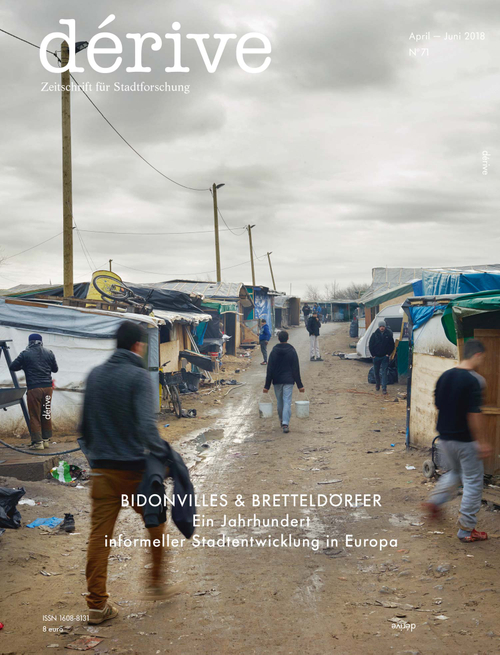
Urbanist journal dérive looks at the history of ‘informal’ or illegal architecture and land-use. In Vienna, informality increased dramatically after the two world wars. The revolutionary insurgency of the ‘settlers’ after 1918 was soaked up by the Social Democrats, who provided them with credit, write issue editors Friedrich Hauer and Andre Krammer. After WWII, the tendency was the opposite: within ten years, ‘conservative-agrarian Romantic notions had become hegemonic’ among ‘small garden’ allotment holders.
Permanent residence on allotments was largely legalized in the early 1990s and many plots sold to tenants – thereby ruling out public land-use in the foreseeable future. What in 1918 had been an emancipatory and anti-bourgeois movement was co-opted by the conservative and reactionary ideal of ‘a home of one’s own’, write Hauer and Krammer.
Yugoslavia: Allocation of public housing in Yugoslavia took place via worker-led factories and enterprises, a system that overlooked unemployment, writes Dubravka Sekulić. Extra-legal housing emerged as an option for those excluded from the system. This gave rise to ‘wild suburbs’ that in turn ‘served as the training ground for the negotiation of the grey, extra-legal space after the collapse of socialism’.
Today, ‘extra-legal construction’ is embedded ‘into almost any new housing project’. A glaring example is the development of the River Sava embankment in New Belgrade. ‘Since 2005, this important piece of infrastructure has become a site for the construction of large riverfront holiday homes, providing yet another example of how, more often than not, informality is a strategy of enclosure and not of emancipation.’
More articles from dérive in Eurozine; dérive’s website
Atlas (Denmark) 1/2018

Instead of focusing on opinion, asks new Eurozine partner Atlas, shouldn’t journalism be trying to understand the world? The idea of ‘searching for the truth’ might have a solemn ring, but what if we rephrase it as a curiosity? It is in this spirit that contributors investigate what community and togetherness entail today.
Religious atheism: Kristoffer Granov visits a secular congregation in London whose aim is to fulfil the existential longing for community without the idea of God. Religious secularism is not a new concept: Thomas Jefferson’s version of the Bible omitted its most miraculous passages and retained the moral guidelines. ‘Religious atheism is not a contradiction in terms, it’s just the claim that the values you adhere to can exist independently of a supernatural being.’
Outsiders: Søren Søberg Poulsen considers what it means to stand outside society at a time when social hermits are linked to terrorism. ‘The outcast has nothing to lose and is therefore capable of doing unthinkable and monstrous things in the attempt to find a place in the world.’ His own anxiety about being alone leads Poulsen to frame ‘outsideness’ as an intolerable condition: ‘Being a part of the world, a part of the social community, is to be human. Being outside the world is to be nothing.’
A cause without rebels: Alexander Rich Henningsen wonders what happened to youth rebellion. ‘I live a life that’s about not letting anyone down, about not doing anything wrong, and most of my friends seem to live by these guidelines too.’ Today’s youth is not lacking in critical consciousness about the neoliberal competition yet fails to rebel against society’s ideal of self-improvement. Why?
More articles from Atlas in Eurozine; Atlas’ website
New Literary Observer (Russia) 150 (2018)
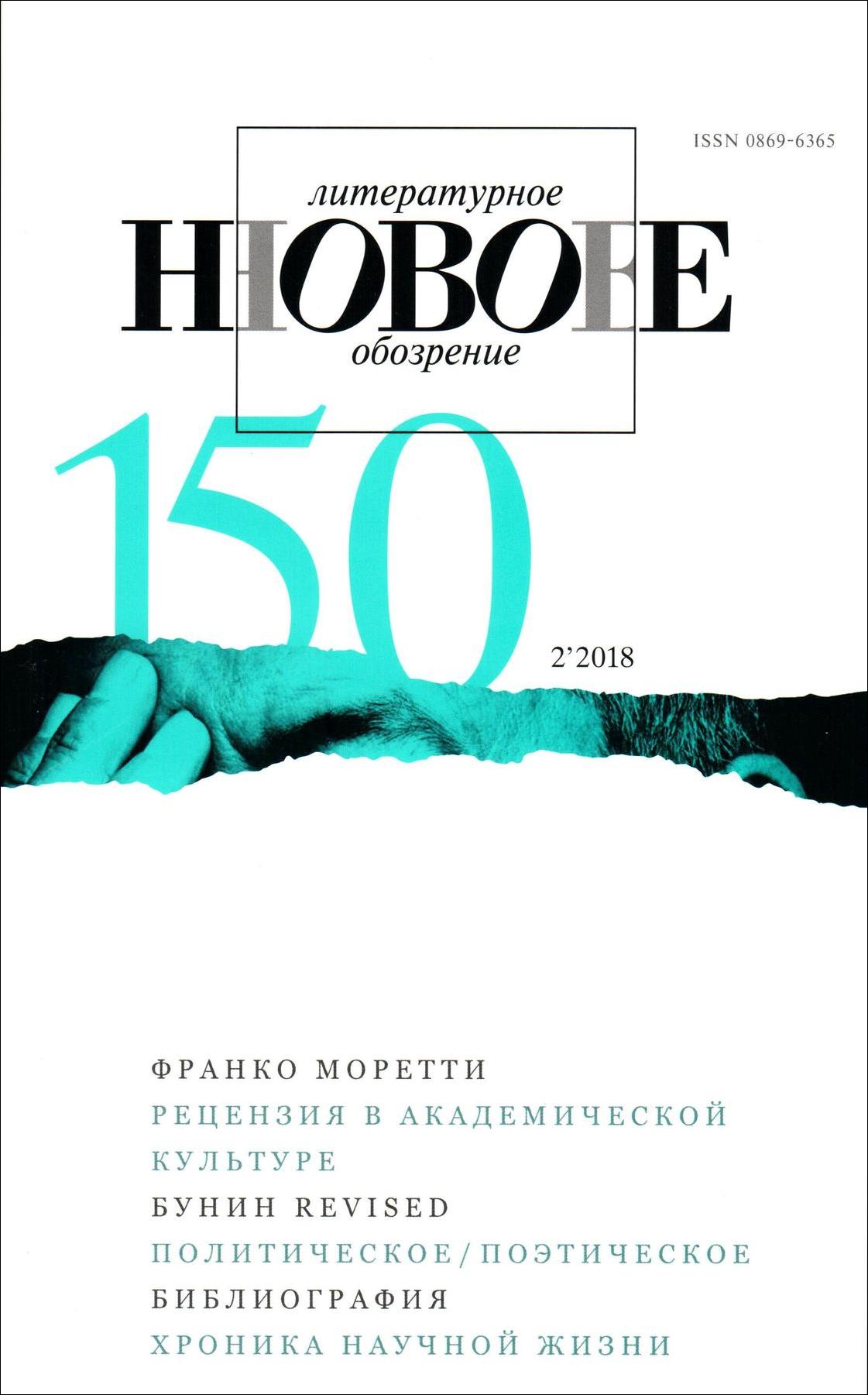
The Russian literary journal NLO devotes an issue to Franco Moretti, leading figure in literary geography and digital humanities, pioneer of quantitative methods in the humanities, and author of the concept of ‘distant reading’. Moretti’s combination of Russian formalism, literary Darwinism, world-systems analysis and ‘computational criticism’ is not without controversy, as the articles in the issue show.
Controversial method: Pavel Arsenev discusses the intellectual genealogy of ‘distant reading’ between empiricism and theoretical abstraction. Moretti’s visualization of big data places his method within the genre of speculative realism, argues Arsenev: ‘We get a new type of epistemological object, the next level of abstraction built upon the language of literature’. Abram Reitblat, on the other hand, is sceptical: Moretti’s work ‘is not so much scientific research as provocative essayism, undermining habitual ways of thinking but not offering any promising examples of research techniques’. Oleg Sobchuk and Artjom Shelya are undecided: ‘Can we create a cultural evolution of literature that will be able to distinguish the numerous regularities from the (yet) chaotic process of literary history? Time will tell.’
Moretti and Russian formalism: Alongside Italian Marxism and British Neo-Darwinism, Moretti’s methodology is rooted in Russian formalism, writes Igor Pilshchikov. ‘Yet, an “autochthonous” reading of Russian formalism differs from that of the “West” primarily by relying on a wider range of texts: most of them simply haven’t been translated.’ Kirill Korchagin, meanwhile, suggest that the popularity of Moretti’s ideas and methods can draw attention to Russian quantitative literary science, ‘which came close to the problematics’ developed by Moretti.
Bunin revisited: Evgeny Ponomarev re-reads Ivan Bunin’s short-story collection Dark Avenues, arguing that its powerful and multifaceted intertext, which reinterprets practically the entire Russian classical tradition, allows the work to be seen as the beginning of Bunin’s turn from modernism to post-modernism.
More articles from NLO in Eurozine; NLO’s website
The Eurozine Review presents a selection of the latest issues of Eurozine partner journals, summarizing their contents in English as a way of encouraging cultural and political dialogue between national public spheres in Europe. Subscribe here.

Published 18 April 2018
Original in English
First published by Eurozine
© Eurozine
PDF/PRINTNewsletter
Subscribe to know what’s worth thinking about.



